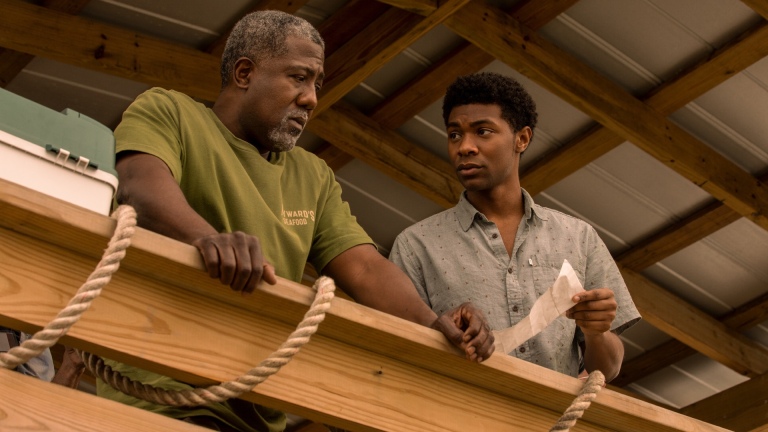John B. Routledge, who is seeking information regarding his father’s disappearance and its relation to a submerged treasure, is the main character of Outer Banks season 1. Together with his closest buddies JJ, Kiara, Pope, and new beau Sarah, John B searches for the gold that has gone missing from the Royal Merchant while also learning the truth about Big John. The Royal Merchant mystery is developed in Season 2 to give the Pogues something new to look for and to give it more significance for Pope in particular.
Pope Heyward, a Pogue who is also one of John B’s closest friends, is crucial to unravelling the mystery of the Royal Merchant. He is the most responsible and diligent member of the group. And he is the one who is most likely to have sense if any. In season one, Pope leaves an interview for a merit scholarship because he is so focused on finding the Royal Merchant, virtually guaranteeing his rejection. His main motivations were curiosity and a desire to support his buddies. But it turns out that Pope and his family will be significantly impacted by the journey.
Although fictional, the history of the Outer Banks includes many real-world influences and inspirations. Denmark Tanny, who is largely based on Denmark Vesey, is one example of an inspiration. Vesey, a carpenter and former slave, won a $1500 lottery and purchased his freedom in 1799 for $600. However, he was unable to get freedom for his wife and children, which some people think served as the driving force behind his work to end slavery. Vesey and African Methodist Episcopal Church officials started organising an insurrection for July 14th in 1822. Vesey was apprehended on June 22 after slaves revealed the details of the insurrection to their captors. By August 9th, 35 people had been executed for their involvement in the uprising, including Vasey.
Denmark Tanny was held as a slave on the Royal Merchant until it sank in the drama. Denmark was the only survivor of the catastrophe, which was transporting millions of dollars’ worth of Spanish treasure. Denmark used the gold to purchase the Tannyhill plantation, which at the time encompassed the majority of the island, as well as his freedom and the freedom of others. The rest was hidden, and in letters to his son, he provided hints as to where it might be.
The Pogues followed this local history and Denmark’s own writings to the gold after Season 1 gave us a portion of Denmark Tanny’s story. This history is further developed and made more relatable in Season 2. Carla shares with Pope how Carla’s own ancestors, who were Cecilia’s slave owners, rejected an offer from Denmark to free Cecilia and their daughter. While attempting to flee, Cecilia was apprehended, but her daughter wasn’t. Denmark eventually received the death penalty for uncovering his wife’s corpse, and his last words, “at the foot of the angel,” were read as additional hints to still another treasure.
Pope discovers that he is the heir to the Tanny legacy and a descendant of Denmark Tanny. Pope’s great-grandmother claims that she withheld that information from the family in order to prevent any of them from becoming enmeshed in retaliation. This may have prevented them from suffering more pain, but it also prevented them from receiving any just inheritances from Denmark’s estate. Pope must not only take Denmark’s life’s unjust treatment into account, but also how it affects his current situation. Outer Banks frequently compares the lifestyles of the Pogues and the Kooks, and when Pope learns about his family history, he eliminates any subtext and calls these inequalities what they are.
After hearing of Cecilia’s passing and reading Denmark’s writings, Pope understands towards the end of the season that the treasure beneath the angel is actually Cecilia’s corpse. It’s natural that Carla Limbrey, of all people, would violate Cecilia’s final resting place after her ancestors executed Denmark for burying his wife, who they also killed. The Pogues take special care to place the casket back where it was discovered. Additionally, they uncover a clue that directs them to the cross’s precise position, which was concealed in the church of Denmark for Freedmen’s rafters.
With the help of Pope’s discovery, Denmark Tanny’s village and his relationship to the Royal Merchant treasure were both reframed. Pope is interested in the treasure for reasons other than financial gain; he wants to do justice to his forefathers and recover property that is rightly theirs. It is reasonable to anticipate that his descendants will have a genuine claim to the wealth as it has always been shown in the programme as being owned by Denmark. Ward took the gold from the Royal Merchant. And after mischief, they also acquired the cross.
The first season is driven by John B’s quest for information regarding his father’s disappearance. The desire to complete what his father started makes the treasure quest for him personally meaningful rather than the possibility of financial gain. The remaining Pogues are motivated by their commitment to one another and wish to leave their current situation. Season two provides Pope with an equal or perhaps more motivation to pursue Ward Cameron and retrieve the Royal Merchant loot.
Because it also touches on actual history and the kinds of legacies upon which America is founded, the haves and have-nots of the Outer Banks and the Pogues versus Kooks dichotomy are richer.

